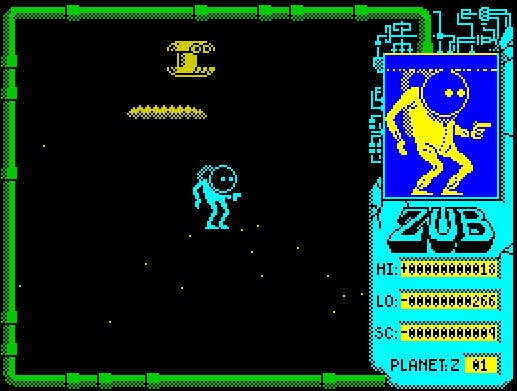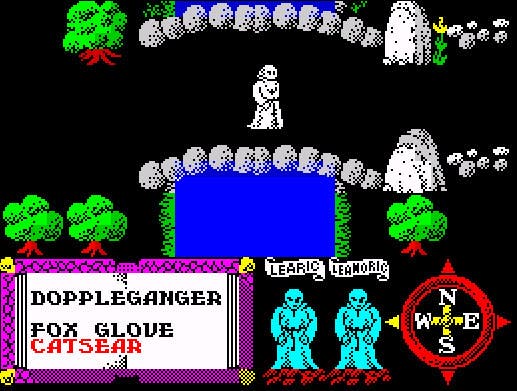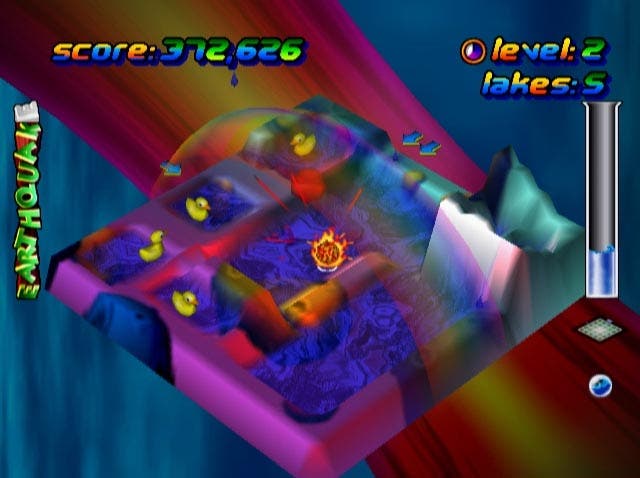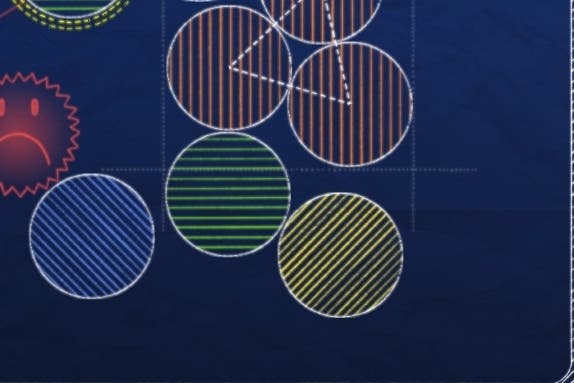Code Britannia: The Pickford Brothers
Meet the most prolific British developers you've never heard of.
You wouldn't think it to look at them, but the two wry northerners tucking into a chicken curry and a veggie burger in a quiet backstreet Manchester pub are among the most prolific and eclectic games developers Britain has ever produced. John Pickford, the coder, and Ste Pickford, the artist, have worked together for the best part of thirty years, clocking up a staggering 86 credited games between them.
They've developed for everything from the ZX Spectrum through to the iPad, and were among the first western developers to work on the NES and the PlayStation 2. Beloved Speccy budget game Feud? That was them. The Spider-Man SNES beat-em-up Maximum Carnage? That was them as well. Mario Artist: Paint Studio for the N64 started life as one of their projects, and it sits in their softography alongside such unlikely bedfellows as cult puzzler Wetrix, Xbox turn-based strategy game Future Tactics and the BAFTA nominated iOS game Magnetic Billiards.
For John, games have been a lifelong calling, and he was coding before he even owned a computer. "Me and my friends used to go into Stockport town centre and go to the library," he explains. "They had a magazine called Practical Computing, one of those big thick ones, and it had listings. We used to write them down by hand, then we'd go into WHSmith and type them in. We'd never finish, because we didn't know what we were doing and they shut at five."
By the time a ZX81 found its way into John's Christmas stocking, he'd already filled a school exercise book with his own biro-scribbled code for remakes of Pac-Man, Breakout and more, based on how he thought they worked. "Did not work at all," he deadpans. "I'm not trying to paint myself as some kind of coding genius, it was just pure delusion. None of them worked at all."
Before he'd even left school, John had sold his first game - a Spectrum text adventure called Ghost Town - to Virgin for £500. A teacher congratulated him on winning the money - "that really offended me," he remarks - but the game brought with it the threat of legal action. "I'd pretty much copied it," John confesses, "But that's what games were then. I thought you saw a game and made your version of it. Every other game was Pac-Man. I just saw this adventure game in a book. I didn't copy the code. I just used the scenario and there was a threat of legal action which really gave me a kick up the arse."

After leaving school, John found a job working for Manchester studio Binary Design where teams turned out dozens of games for the Spectrum, C64 and Amstrad on behalf of publishers such as Mastertronic and Quicksilva. For younger brother Ste, however, games weren't part of the dream. "I wanted to be a comic artist," he explains. "That was my big career plan."
That all changed during his final year at school, after John pulled some strings to get his brother a work experience placement alongside him at Binary Design. "I managed to get a week off school and sit around watching him make computer games" Ste recalls. "They asked if I wanted to work on a loading screen for a game rather than make the coffee all day and I said 'Yeah, alright'. Then it was 'We've got this other game that needs a loading screen' and I think I did three that week, and at the end they said 'Could you stay for another week?'"
That week then turned into an offer of a full-time job. "An artist that could draw was quite a novelty," laughs John. "The artist was usually just a programmer who couldn't program". The Pickford Brothers as a game development entity was born, with the popular Spectrum game Zub marking their first official collaboration. Between 1985 and 1987, the pair would work on twenty games for Binary Design's various clients. John's childhood fondness for working games out on pen and paper stood him in good stead, and his habit of planning titles out before putting fingers to keyboard - what we'd now call "design documents" - meant that the Pickford name became a byword for quality, and as the teams required to develop games grew larger, both John and Ste found themselves working as project leads or design directors.
The industry was changing, however, and the Pickfords set up their first self-owned company, Zippo Games, which was hired by Rare to help them transition between the company's 8-bit incarnation as Ultimate: Play the Game, and the new console-based business that it hoped to become. "We had the weird experience, right after doing the Spectrum games we started working with Rare on their NES stuff," Ste explains. "Way before most British developers had got their hands on it."
Like most veterans of the British 8-bit scene, the Pickfords had gravitated towards 16-bit computers, and found Nintendo's relatively underpowered toybox less than impressive. "We were laughing at it," John remembers. "We're working on the Amiga! This is like a step back!"
Working with Nintendo, via Rare, forced the brothers to reconsider their approach to game design. "It sounds silly now," says Ste, "but one of the things they said was 'You have to be able to finish the games.' And we just laughed. What we used to do, with games like Zub, was each level there'd be a variable like speed or number of baddies or something like that. You'd just write it in such a way that each level it'd crank up a bit until, presumably, it's impossible to play. I don't know! You'd just play as much as you could."
"Each level there'd be a variable like speed or number of baddies or something like that. You'd just write it in such a way that each level it'd crank up a bit until, presumably, it's impossible to play."
Ste Pickford

Now working in senior roles at another Manchester studio, Software Creations, the Pickfords found themselves mostly doing work-for-hire on licensed games for the SNES and Megadrive for American publishers. This is how they ended up credited on unlikely games such as Disney Princess spin-off Beauty and the Beast: Belle's Quest and educational titles like Thomas the Tank Engine and Sesame Street ABC 123. "I love that stuff," John admits. "I actually relish being asked to design a game I wouldn't normally play." They managed to squeak a few of their own ideas in between the production line jobs, however, including fondly remembered SNES platformer, Plok!
In the mid 90s, the brothers went full indie once again, breaking off to form their second studio, Zed Two. More licensed work for hire followed, but there was a renewed emphasis on original concepts, as demonstrated in watery puzzler Wetrix, released by Ocean in 1996. As consoles grew more sophisticated, however, development costs were rising and the risks proved too much for a vulnerable small outfit working at the mercy of publishers. Ambitious strategy game Future Tactics struggled to find a home after original publisher Rage went bust, and then US firm NewKidCo went out of business, owing the Pickfords a cool million for work on an unpublished E.T. game for the PS2 and GameCube.
Undaunted, the brothers regrouped in 2004 as Zee Three and started working on PC and mobile games, developing concepts and prototypes as a none-more-indie duo. "There's not many people who are doing what we're doing," says Ste of their return to bedroom coding. "I know loads and loads of people from back then, and what they tend to be is a technical director at an EA studio". He laughs. "Basically sensible careers where they get a great salary!"
"I think what's unusual about me and you is that more or less our whole career we've been inventing games," adds John, "But as they got bigger and bigger budget-wise, we just veered off into small budget."
They openly admit to being skint, so isn't there anything they hanker for from the days of studio work? "Oh yeah, there's loads of stuff I miss," says Ste. "I like working at home, and I'm perfectly happy working alone most of the time, but I miss being in a room full of artists and engineers. Twitter and Facebook make up for it a little bit, but I miss seeing other people work, learning from and being impressed by what other people are making, and being inspired by your colleagues to do better work. I miss going for a pint with everyone after work on a Friday too, and talking crap about the games industry. I probably miss that most of all."
"The current indie and mobile scene does feel a lot like the 8-bit days in many ways."
Ste Pickford

If their current situation has yet to bring in the big bucks, it at least seems to have led the prolific pair to their most creative incarnation in years. Ingenious iOS game Magnetic Billiards was nominated for a BAFTA in 2012 and the brothers are currently mulling over various new concepts as well as reviving their PC hit Naked War for mobile.
Pocket money priced games. An environment where new ideas can be developed and sold in a matter of months. From the outside, it looks a lot like they've come full circle. "The current indie and mobile scene does feel a lot like the 8-bit days in many ways," Ste admits. "As a designer it feels exciting in that we can just come up with an idea for a game - even a wacky off the wall idea - and start making it the next day if we want. I know that's down to being indie, but that's very similar to how it was when making 8-bit games, and something that was lost in the console world, where there was a long route from idea to greenlight, where odd or original ideas would be weeded out, or bashed into the same shape as existing games in order to tick the boxes."
As always, where the Pickfords have been led by circumstance, the industry has ended up following. Both are clearly energised by the flourishing indie scene where its the ideas, rather than the production values, that matter. "Even though there are all these huge epic things, BioShock and all that, for something as pure as Minecraft to be a big success is really encouraging," says John. "The wisdom of the industry isn't always that wise."

